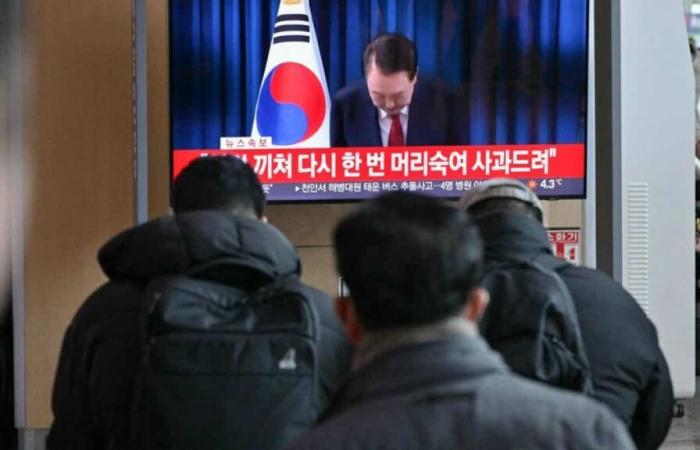South Korean President Yoon Suk Yeol presented his “sincere apologies” on Saturday for imposing martial law, but did not resign, a few hours before a Parliament vote on his impeachment.
• Also read: South Korea: Yoon Suk Yeol, an unpopular president, who surfs from political crisis to family scandals
• Also read: South Korea: abandoned by his party, President Yoon close to fall
• Also read: [EN PHOTOS] South Korea: demonstrations in Seoul to demand the dismissal of Yoon Suk Yeol after his coup
In a brief televised address to the nation, Mr. Yoon announced that he will entrust his party, the People Power Party (PPP), with taking “measures aimed at stabilizing the political situation, including regarding my mandate”.
“I will not shy away from my legal and political responsibilities regarding the declaration of martial law,” he said.
The head of the PPP, Han Dong-hoon, immediately affirmed that “an early resignation of the president is inevitable”, the normal exercise of his functions being according to him “impossible in these circumstances”.
But the PPP is divided on the issue.
At the end of a meeting overnight from Friday to Saturday, a majority of party deputies stuck to the official line according to which they will block the impeachment, against the advice of their leader Mr. Han.
The National Assembly must vote at 5 p.m. local time (8 a.m. GMT) on the impeachment motion.
The unpopular conservative president is accused by the opposition of having shaken the young South Korean democracy by imposing martial law by surprise, before reversing course barely six hours later under pressure from MPs and the street.
On Friday evening, around 15,000 demonstrators gathered in front of the National Assembly to demand the departure of Mr. Yoon and his arrest, according to AFP journalists on site. Some stayed all night.
New events
New protests are planned for Saturday afternoon in front of Parliament and in downtown Seoul. The organizers said they expected 200,000 participants and the police “tens of thousands”.
Fearing a new nocturnal coup by Mr. Yoon, who had disappeared from the public scene since dawn on Wednesday, opposition deputies camped out all night inside the National Assembly.
Buses and other vehicles were parked on plazas around the building to prevent possible special forces helicopters from landing.
“The night will be the most critical moment,” opposition leader Lee Jae-myung told AFP on Friday evening, suspecting Mr. Yoon of wanting to “try his luck again.”
In his speech on Saturday morning, however, the president assured that “there will never be a second martial law”.
“I apologize for causing fear to the people,” the president concluded before bowing.
During the night from Tuesday to Wednesday, around 280 soldiers burst into Parliament, where the opposition had called an emergency session after the establishment of martial law by Mr. Yoon.
Parliamentary assistants prevented them from entering the chamber by blocking the doors with furniture, while the 190 deputies who had managed to sneak into the building unanimously adopted a motion calling for the measure to be lifted. exceptional.
Mr. Yoon complied shortly after, as required by the Constitution, repealed martial law and sent the soldiers back to their barracks.
A majority of 200 deputies out of 300 is necessary to dismiss him.
Mr. Yoon’s People Power Party (PPP) has 108 deputies and the opposition 192. The opposition therefore needs to rally at least eight deputies from the presidential camp to its cause to win.
If the impeachment is voted for, Mr. Yoon will be suspended from his functions until the Constitutional Court validates or not the decision of the deputies. If so, an early presidential election will take place within 60 days.
In addition to the impeachment procedure, Yoon Suk Yeol is the target of a police investigation for “rebellion”, a crime theoretically punishable by the death penalty (which has not been applied in the country since 1997).






